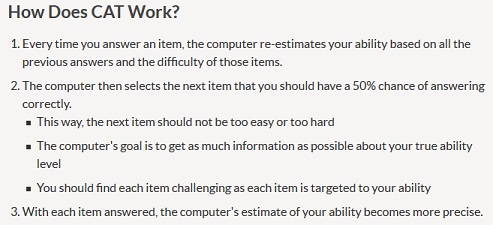Posted On: Friday - May 4th 2018 3:34PM MST
In Topics: Curmudgeonry Artificial Stupidity Educational Stupidity

The Peak Stupidity blog does try with our utmost alacrity to follow up on the thoughts from previous posts. This and the subsequent one will be that type. As a follow-up to the somewhat boring discussion on multiple-choice testing, I will relate what I've learned only recently about the newest type of computerized testing. This WILL NOT be boring to you if you do have a test like this coming up. You may be more like enraged and exasperated, in fact, if you are old enough to have taken these types of tests, in this case it's a medical board test, in the past.
Look, I completely understand the value, in terms of quality control and cost savings (to the test-MAKER, BTW, not passed on to you, the measly test-TAKER!) of automating this type of thing. It's a pretty mindless and tedious process otherwise, though not as tedious as the grading of problem-working tests, as explained in that previous post. However, it turns out that things have changed lots since software has become so fast and cheap (to write, not to buy!), and these new tests are way, way out there, man!
What it comes down to is that the newer tests are designed to completely eliminate any test-taking strategy. That's the gist of it, and I don't say that is particularly a bad thing, just a different thing, hence the curmudgeonry tag attached herein. More on the philosophy of this, but let me get to some details to show you the weirdness that makes a testing strategy pretty much impossible.
Yeah, first thing you may already know, is that computerized test can be made for which one cannot go back to previous questions. There's no reason they have to be this way, but they seem to all be - both in school and in these national boards. This eliminates one valuable tactic that is known by many who went through lots of schooling. It doesn't take accidental duplicates, but there are usually a number of questions who's premises help answer a following or previous question. The lack of any way to flip back and forth eliminates this way of correcting wrong answers. Again, it's not necessarily a bad thing, and not any less fair.
However, look at this shit:

I'll give you more details. You've got most of the day to do this test, OK? However, you don't HAVE to finish all the questions and you may not GET TO finish them all! As you can see in the graphic above, the questions get harder the better you
Oh, and this little tidbit of stupidity may come into play: Were you to not finish all the questions by the time limit, yet the software hasn't sent you home, then the last 60 questions matter as to whether you passed or failed (but you've gotta get past about 3/4 or so of the questions for this unknown ending).
What can one say about this? Well, it may be a "pro" in favor of just testing for knowledge and eliminating all general "testing ability" gained from taking many tests over the years. Those who have never done this sort of thing and didn't take 10 practice SAT's with a stopwatch will be made equal. This does make it more fair, as a way of testing just what the test is about. OK, fine, but with all the complicated rules, the bad thing is this - It's hard for someone in the middle of it to have any confidence at all. You don't know how you're doing, you go counting how many questions you've nailed, how many just need a quick check-over, and how many are pure random guesses. This, for old-fashioned, normal standardized multiple-choice testing, gave one a good idea of where he stands (with an eye on the clock too) during the test, and a very good idea of how one did after it's over, but before the results come in.
Mull on these test rules for a bit, and think of how you could possibly have any kind of strategy and/or confidence. The only way this test can be made NOT maddening is if you know the material inside and out (that's not always even the case, as per the post on multiple choice tests, sometimes one has to guess the knowledge of the test-makers.) As for the rest, is it any wonder that these test-makers get their questions spread all around the internet? When you fail one of these things, you won't ever know how you went wrong. Oh, yeah, is it really that tough to make the software give you your results before you leave the room? It knows, so why can't it tell you? (Yeah, I guess they check for gun and hammers at the same time as for cell phones and earbuds.).
Yeah, can you tell that I'm starting to think the cons outweight the pros? Computerized Adaptive Testing, yeah, I'm so glad I am done with all of this.
Comments: